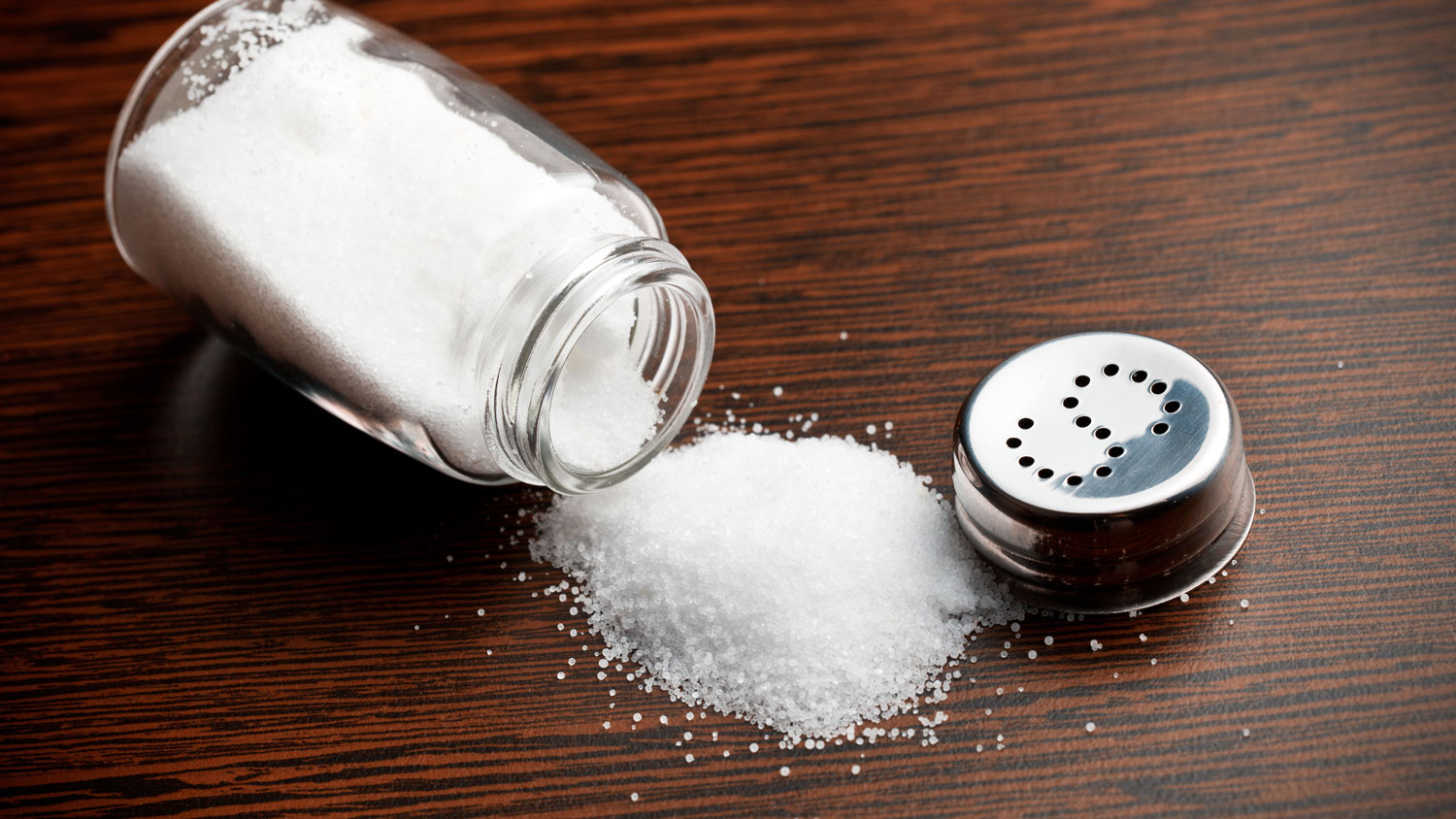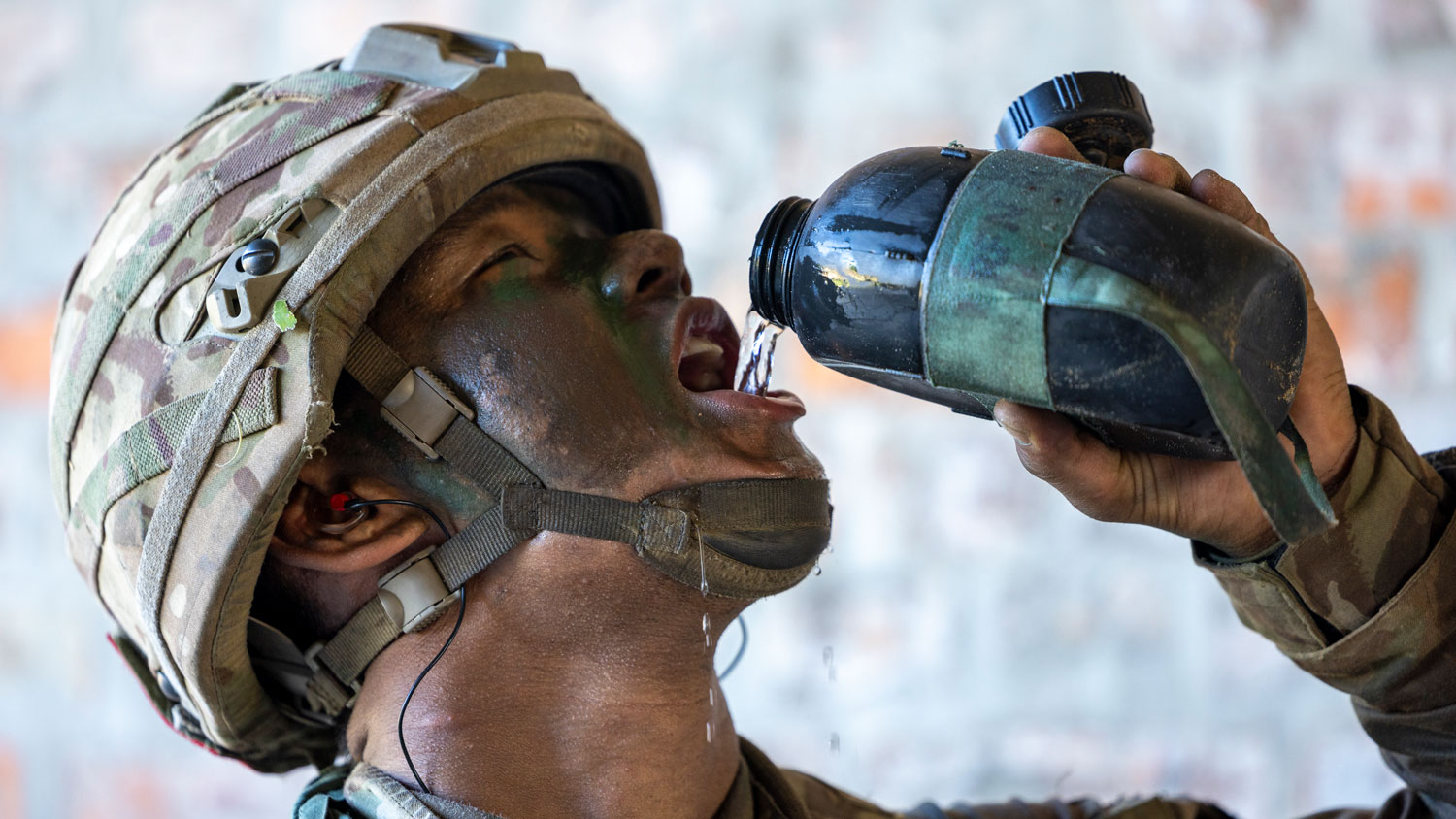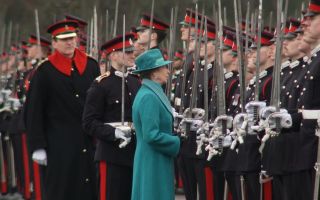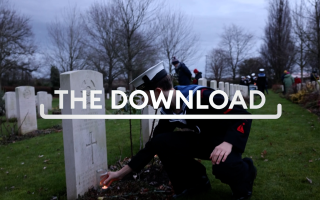How salt helps Guardsmen from fainting in the heat but might not be great for civvies
Soldiers around the world, like some athletes, are known to increase their salt intake in the lead-up to moments of extreme exertion in hot temperatures.
Coping with hot weather is a particular issue for the Armed Forces on parades, not least members of the Household Division that includes the Household Cavalry, Grenadier Guards, Coldstream Guards and the Scots, Irish and Welsh Guards, who often have to stand and march for prolonged periods of time in ceremonial dress uniform.
A number of Guardsmen passed out during a rehearsal for Trooping the Colour in July 2019, while a soldier from the Scots Guards fainted during the 2010 Colonel's Review, to name just two moments when troops have struggled in intense heat.
- Fancy five days in a sauna? Researchers think it could prevent fainting on parade
- 'Taboo' of forces fainting: Can it be prevented?
- Soldiers brave the heat as they rehearse for crucial role in Japanese state visit
Reports in 2019 suggested that salt could be supplemented to soldiers' diets to help prevent fainting – but how effective is salt in the prevention and treatment of heat-related conditions in general?
British military medics are among the world's Armed Forces to contribute to research into the effects of low sodium, electrolytes and hydration on the body in hot weather, in tandem with the United States and NATO allies.
At the same time, research has also been carried out into how increased sodium in the form of salt loads might prevent personnel from fainting during long parades when temperatures are soaring.
Some studies by NATO into heat illness, hydration and low sodium have also studied heat-related medical challenges facing allied troops deployed to hot climates, such as Iraq and Afghanistan and also considered ways individual soldiers could measure and diagnose their own hydration status and determine whether they needed additional fluids and other hydration needs during operations.
There has been a raft of other research by military bodies into how soldiers can maintain performance by ensuring a balance of water levels and sodium in the body – especially considering the tough physical demands that troops face when carrying heavy loads of gear in extreme conditions during deployments in hot climates. This includes research into the prevention of confusion, dizziness, fainting and more extreme conditions such as heat illness.
Major Iain Parsons, a British Army lecturer and cardiologist, explaining why salt was one factor that could help prevent Guardsmen fainting, in an interview with The Times in 2019, said that it could increase plasma volumes – the amount of water in the blood, adding: "That means you can stand up for longer."
Research by Maj Parsons was feeding into other studies into salt intakes by British and allied forces personnel that could help soldiers on operational deployments in relation to heat illness among those posted to hotter climates.
Some reports suggest that research has aimed to test whether Guardsmen who had increased salt in their diets by up to ten grams a day, four grams higher than the NHS daily recommendations, in the week leading up to a parade would be less prone to feeling faint.
One former Guardsman, who did not wish to be named, said that during his service, he and his colleagues were encouraged to take salt loads in the lead up to long parades such as Trooping the Colour.

Should the civilian public increase salt intake in hot weather?
The advice from the medical profession and the NHS is that the UK public already has far too much salt in their daily diet and that there are other ways to keep themselves cool, hydrated and healthy in hot weather.
NHS GP, Dr Hugh Pelc, said: "The general advice would be to pace yourself in the heat so that you do not get too hot in the first place and save exertion for the mornings and evenings when it's cooler."
He added that drinking plenty of water was enough to keep people hydrated.
The UK Government recommends that adults and children aged 11 years and over should have no more than 6g of salt per day and the NHS recommends drinking 1.2 litres of water per day to stay hydrated.
These two recommendations should be enough to keep most healthy adults, with a well-balanced diet, hydrated and healthy, even when the weather heats up.
There is little doubt that people do lose salt through sweating in hot weather however, but there should be no need to top up with more salt unless there is a specific health need, or if someone is undertaking extreme sports such as an ultra-marathon.
Research into athletes has shown improvements to performance with the right balance of sodium and water to replenish electrolytes and salt, but in both cases, this should only be considered following an assessment by a medical professional who would also consider other health factors such as weight and body mass.

In 2003, Nato's Research And Technology Organisation (RTO) conducted research on issues related to performance, heat illness susceptibility and coping in extreme heat for military personnel deployed to hot climates like the Middle East and Afghanistan's mountainous terrains.
A report by the RTO noted that soldiers operating in the extreme conditions of hot climates could be prone to heat illness and hyponatremia, a condition in which sodium in the blood drops to lower than normal and which in severe cases can lead to confusion, coma or epileptic seizure.
In some cases, this could be brought on by overcompensating and drinking too much water – diluting the sodium in the blood.
Researchers pointed out that: "Clinical staff reported a small number of cases of severe hyponatraemia amongst the heat casualties.
"This prompted a review of advice on salt replacement and all personnel were advised to add salt to their diet."
Their report added: "Overall acclimatisation and practical experience of the conditions were the most important elements in reducing heat casualties.
"All personnel understood the importance of fluid replacement of sweat losses.
"Whilst it was decided not to advise the specific addition of electrolyte replacement to water, it was considered that dietary supplementation of salt intake was likely to be beneficial."
The study concluded that further research should be conducted into the effects of water loss in the body during operations in extreme climates but called for the development of non-invasive methods by which personnel could measure and diagnose their own hydration status to determine if they needed additional fluids or sodium so they could monitor their own performance during operations.
There is also advice on the use of salt in the treatment and prevention of heat illness in the British Army's Commanders' Guide, which recommends that "Under conditions that cause persistent sweating, acclimatised personnel should receive sufficient salt from their normal diet.
"It is therefore important to maintain food intake throughout the day.
"Non-acclimatised personnel may need extra salt with their food.
"However, salt should be added 'to taste' as excess salt intake is dangerous."
The guide adds advice on drinking electrolyte drinks, of the kind used by athletes and others taking part in sports, saying: "When eating is not possible, or a person has lost their appetite, electrolyte drinks should be provided to replace fluid and salt.
"If electrolyte drinks are not available, salt should be added to water – one sachet (1g) of salt to one litre of water, or two sachets to 1.5 litres of water."
Should the public follow the military example?
Generally, the medical advice for the general public is not to increase their salt intake unless directed to do so by a health professional after an assessment of medical need.
Medical advice website Healthline reports that two electrolytes – sodium and chloride – are the key ingredients in table salt and salt tablets, which have been used for years to treat heat cramps and restore electrolytes lost through sweating.
It adds: "Some doctors still recommend salt tablets for limited use, but because of some health risks involved, salt tablet use is often discouraged in favour of other rehydration options."
The site said additional salt would help only in limited situations, such as when someone would be physically active or in heat for extended periods of time and if they were already well-hydrated before an activity and only then when taken with water.
Generally, it said that people's bodies are at their healthiest when they have the right balance of water and sodium but that, "Typically, drinking enough water and following a healthy diet are enough to keep everything working optimally while you go about your daily activities."









